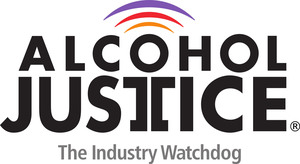Alcohol Justice Releases "Field Guide to Entertainment Zones, Party Zones and Social Districts" on the Eve of the California's 1st "Entertainment Zone" Set to Open in San Francisco on Halloween
London Breed may have had a hard time coming up with a costume, but we really question her decision to go as 2006's Gavin Newsom
SAN RAFAEL, Calif., Oct. 30, 2024 /PRNewswire/ -- Following the recent passage of California SB 969 (Wiener D-San Francisco), cities and towns throughout the state now have the option to establish "entertainment zones" that permit bars and restaurants to sell alcohol directly on the street, creating bustling social hubs but raising significant public safety concerns. With minimal regulatory guardrails, and disturbingly growing rates of alcohol-related deaths, community groups and advocates are raising awareness about the potential risks and advocating for public health safeguards.
"In response to the state's latest dangerous alcohol policy change, we are releasing the Alcohol Justice Field Guide to Entertainment Zones, Party Zones and Social Districts – a citizen-advocate guide to reducing harm from unaccountable street alcohol sales," stated Cruz Avila, Executive Director of Alcohol Justice. "Negligently absent a rigorous state monitoring strategy, it falls on community members and local organizations to provide oversight."
Under SB 969, these "entertainment zones" allow businesses within designated areas to serve alcohol directly to patrons outdoors, turning city blocks into open-air parties that stretch across multiple areas without robust oversight. Although SB 969 mandates identification checks for minors, the legislation lacks comprehensive safety measures, relying heavily on local entities and communities to monitor potential issues. The precedent set by cities like New Orleans, where open-alcohol policies have coincided with spikes in violence and other crimes, underscores the need for active engagement and monitoring in California's new entertainment zones.
"San Francisco Mayor Breed may want to mark the anniversary of the 2006 Halloween Castro St. shooting by seeing if she can recreate it, but that does not mean her constituents haven't learned from the past," said Carson Benowitz-Fredericks, Research Director at Alcohol Justice. "There is real engagement and enthusiasm around healthy streets and pushing back on the runaway alcohol death rates. There are so many people who want to protect their towns, who want to be heard. We're trying to give them the tools to make it happen."
Community Concerns and Key Risks
Research and observations from similar entertainment zones have identified several risks associated with unmonitored street-level alcohol sales, particularly:
- the likelihood of increased violence
- dangerous driving
- underage drinking
With limited options for safe transportation and accountability, open-air drinking areas can become magnets for "drunk tourism," which heightens the risk of violent incidents and traffic collisions. Community leaders are especially concerned about the economic impact on local businesses that do not benefit from the zones, as well as the strains placed on emergency and police resources due to increased calls and safety incidents.
Alcohol Justice encourages community members to investigate and document these risks. Tracking data, from police logs to social media reports, enables a comprehensive assessment of zone-related incidents, creating a powerful case for safer regulations. This grassroots documentation is critical, as public health surveillance and reporting on entertainment zones' impact have not yet been established at the state level.
Reducing Harm Through Community Action
The passage of SB 969 has left advocates and local organizations to play a pivotal role in harm reduction by observing and recording zone-related issues. A University of North Carolina team formulated a targeted approach called "Investigate, Document, and Act" (IDA) for those concerned about the zones' impact. By documenting incidents and sharing concerns with local and state authorities, residents can amplify their voices and demand safer community conditions. Alcohol Justice recommends reporting directly to the California Department of Alcoholic Beverage Control (ABC), local law enforcement, and city councils to make concerns heard and build support for enhanced safety measures.
"With entertainment zones soon to be part of California's social landscape, collaboration among community members, local organizations, and advocates will be crucial to safeguard public health and safety," said Raul Verdugo, Advocacy Director at Alcohol Justice. "We encourage increased community involvement utilizing our Field Guide which is designed to support environmental prevention efforts to reduce alcohol-related harm at the local level."
For more information or to get involved, contact Alcohol Justice at [email protected].
CONTACTS: Michael Scippa 415 847-3006
Carson Benowitz-Fredericks 917 426-5995
SOURCE Alcohol Justice

WANT YOUR COMPANY'S NEWS FEATURED ON PRNEWSWIRE.COM?
Newsrooms &
Influencers
Digital Media
Outlets
Journalists
Opted In





Share this article